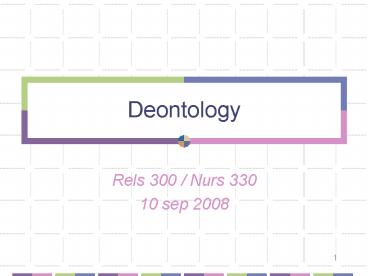Deontology - PowerPoint PPT Presentation
1 / 12
Title:
Deontology
Description:
DEONTOLOGY. An act is right if it conforms to a moral rule. It is your duty to ... Deontology as a moral theory insists that we have moral duties to do certain ... – PowerPoint PPT presentation
Number of Views:3607
Avg rating:3.0/5.0
Title: Deontology
1
Deontology
- Rels 300 / Nurs 330
- 10 sep 2008
2
DEONTOLOGY
- An act is right if it conforms to a moral rule.
- It is your duty to do what is right.
- An act cannot be judged by its consequences.
- Immanuel Kant (1724-1804)
- Kantian deontology is an ethic
- of respect for persons
- for oneself
- for others
3
KANTS CATEGORICAL IMPERATIVE
- Supreme principle of morality
- general formal principle
- specific moral maxims or duties are derived from
the formal principles - Kant uses 2 formulations of the categorical
imperative - they are the two formal principles which underlie
Kants deontological theory
4
Categorical Imperative 1
- ACT ONLY ON THAT MAXIM THROUGH WHICH YOU CAN AT
THE SAME TIME WILL THAT IT SHOULD BECOME A
UNIVERSAL LAW - You would approve of this action being one that
every other person would also follow - do not lie
- help others in distress
- treat others fairly
- treat others as you would want to be treated
5
What does universal mean?
- Dont make exceptions for yourself
- Dont make exceptions for people that you DO or
DONT like - Dont make exceptions in particular contexts or
situations. - So, do not lie OR always be truthful means just
that in all circumstances in deontology or duty
ethics. - It is not OK to lie if it makes things easier for
you, or if someone is sick, or if someone else
will get into trouble.
6
Categorical Imperative 2
- ACT IN SUCH A WAY THAT YOU ALWAYS TREAT
HUMANITY, - WHETHER IN YOUR OWN PERSON OR IN THE PERSON OF
ANY OTHER, - NEVER SIMPLY AS A MEANS, BUT ALWAYS AT THE SAME
TIME AS AN END. - also known as the practical imperative
- do not use people for your own ends (or goals, or
purposes, or to get what you want) - respect people as ends in themselves
7
RESPECT FOR PERSONS
- The 2 formulations of the categorical imperative
provide the foundation for Kantian deontology as
an ethic of respect for persons. - Each person is a rational being,
- We are all capable of making our own decisions,
taking responsibility for our own actions, and
establishing our own goals and values. - Each person is unique, irreplaceable, and
deserves respect.
8
What does this mean in practice?
- Is it OK for medical students to practice
performing pelvic exams on women anesthetized for
surgery? Why or why not? - Is it OK for a surgeon removing a prostate gland
to extract sperm for use in artificially
inseminating an infertile patient? - What does it mean to use a person as a means to
your own ends? Give an example.
9
SUMMARY
- Deontology as a moral theory insists that we have
moral duties to do certain things because the
action is inherently right. - Respect is primary.
- Differences in contexts, participants, or
cultures do not change our duties. - Consequences, whether foreseen or not, do not
change our duties or relieve us of them. - You will be a moral person if you reason out for
yourself the human moral duty in the situation
and fulfill it. - Any questions?
10
Geographic Information Systems Code of Ethics
(2003) (example of a deontological code of
ethics)
- Respect Privacy
- Protect individual privacy.
- Be especially careful with new information
discovered about an individual through GIS-based
manipulations - Respect Individuals
- Encourage individual autonomy.
- Avoid undue intrusions into the lives of
individuals. - Be truthful when disclosing information about an
individual. - Treat all individuals equally, without regard to
race, gender, or other personal characteristic.
- Be Honest in Representations
- State professional qualifications truthfully.
- Make honest proposals that allow the work to be
completed for the resources requested. - Deliver an hours work for an hours pay.
- Describe products and services fully.
- Be forthcoming about any limitations.
11
Case Studyadapted from http//www.acponline.org/c
linical_information/journals_publications/acp_inte
rnist/mar08/four.htm
- An 83-year-old woman of Russian descent is
hospitalized with progressive dyspnea and a chest
X-ray highly suggestive of metastatic cancer,
which is confirmed on bronchoscopy. Her two sons
adamantly insist to the attending physician
that their mother not be told that her illness is
terminal. Their father died of cancer when they
were young, they explain, and their mother is
consequently so terrified of cancer that she
would be devastated by the diagnosis, even
potentially suicidal.
12
According to a deontological perspective
- What should the physician consider when deciding
what she should do?
- What duties does the physician have toward her
patient?






























